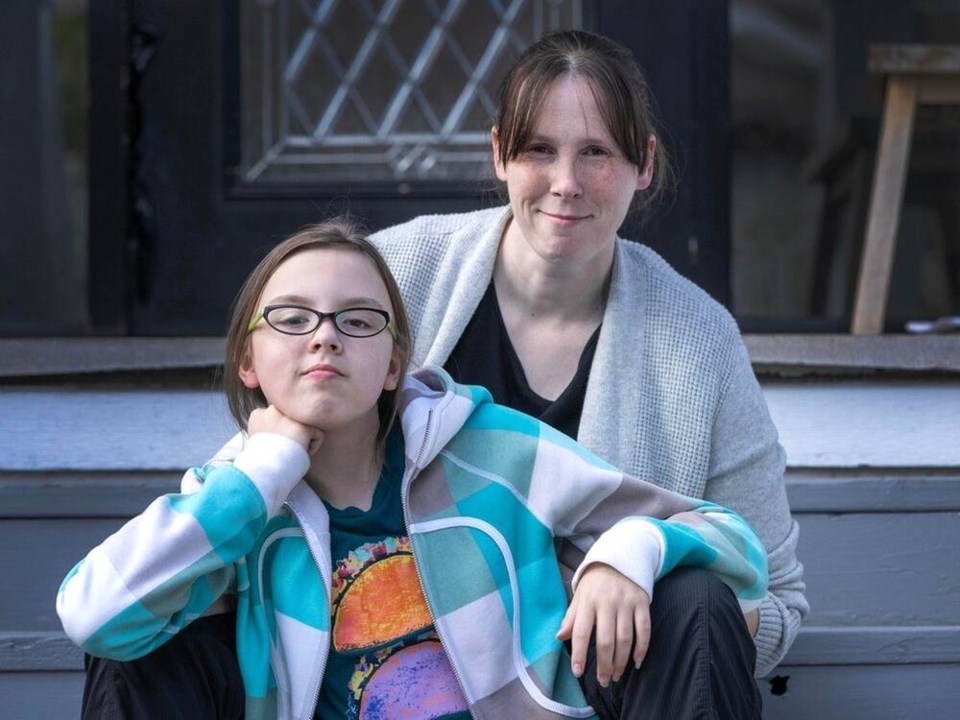By Grade 2, Avery Hopkins was reading at a university level. Her parents knew she was different. They just didn’t know how different, or how those differences would affect her.
Now 12 years old, Avery is fascinated with advanced mathematics and science, and plans to become a biopharmaceutical engineer.
After years of struggling to fit in with her peers, and trying to find a place to just “feel normal,” her hopes of attending a specialized program for exceptional students have been crushed, according to her mother Kristin Hopkins.
Avery had planned to apply to the Transition Program for Gifted Students, known as UTP, a two-year academically accelerated program operated by the Ministry of Education and Child Care Provincial Resource Program. The program is held on the UBC campus and staffed by Vancouver School Board educators and administrators.
In January, UTP announced that it had paused the admissions process for the 2024-2025 school year, while pending an external review.
The decision was made “in response to significant concerns raised about interactions within the school community that have impacted the mental health and well-being of some students,” the Ministry of Education said in a statement.
The cancellation of admissions has left families scrambling, and a group of parents has retained counsel to fight for their kids’ access to the specialized education.
The legal letter addressed to the Vancouver School Board, the Ministry of Education and UBC, states that the school board has a duty to implement an education in the best interests of special-needs students, and to consult with parents about that education.
They cite a 2006 B.C. Supreme Court judgment (Hewko vs. British Columbia) that ruled classrooms must make meaningful accommodations for special-needs students, and argue that high-achieving children must have equitable participation in special education.
Assessed as profoundly gifted, Avery has struggled with anxiety, social and emotional regulation due to her learning differences.
“People hear giftedness and they think it’s some fabulous thing, but it’s a neurodivergence, and it’s really a special-needs diagnosis,” said Hopkins.
The family finally found a place for her at Choices School, a private school for gifted children in Richmond — but it is a financial stretch for their family of five.
Some 1,600 parents, students and alumnae of the UTP program have signed a petition, asking that the Vancouver School Board restart the admissions process and criticizing the process for shutting families and kids out.
“The pause in admissions was a surprise to everyone, and it has caused mental health issues for students currently in the program who have no idea what the future holds for them,” said Jonathan Chan, 16. Students are worried the program will be cancelled altogether.
Chan, who graduated from the program at 15 and is now a pharmacy student at UBC, said the program is rigorous, but he felt well-supported through it by fellow students and teachers.
The pause in enrolment removes the only publicly funded option for kids who need an accelerated learning environment, said Chan.
“Wealthy parents will still be able to enrich their kids’ education through tutoring and private schools, but less-resourced parents won’t have an equal chance.”
Amber Lee, 15, a current student in the program, is one of 60 students and alumnae who wrote to Premier David Eby to plead their case.
“Gifted learners have a high drop-out rate, and tend to struggle with anxiety, depression, and other mental struggles,” they wrote.
“I felt isolated and very alone before I came to UTP,” said Lee, adding that without an intake of students next year, some kids will not get the full benefit of the program.
“Like other neurodivergent learners, we deserve to have a program that fits our needs,” said Lee.
On April 22, the Gifted Children’s Association of B.C., an advocacy group, said in a statement that they met with all three governing parties to find out why admissions were paused and understand the goal of the review.
They were told the review is to “examine operational and financial matters, program structure, administration, relationships and support services,” and “look into the social emotional issues that were raised in January 2024 that have caused concern.”
“If there is an issue about social emotional support, then the program needs to be providing that,” said Maureen McDermid, secretary for the association’s board of directors. If no issues are found, she hopes admissions will be reinstated promptly.
McDermid said programs in the province that support gifted students are being shut down.
In 2021, the Vancouver School Board began to phase out its multi-age cluster classes designed for children with high IQs, and said in a report that “segregating learners with a gifted designation amongst themselves does not develop a well-rounded student.”
The move toward a policy of inclusion, and away from “segregating” students of different abilities may not be appropriate if regular classrooms can’t accommodate their needs, said McDermid.
“For gifted students, their social emotional needs are met and they flourish when they are with like-minded peers,” said McDermid.
Alison Ogden, associate superintendent of the Vancouver School Board, said the nature of concerns brought by students, staff and parents at the UTP could not be shared for privacy reasons, and that the pause in intake was not a “unilateral” decision made by the school board, but was agreed upon by the board, the education ministry and UBC.
Ogden said gifted-designated students in the Vancouver district will have the opportunity to pursue accelerated learning or individual education plans within their regular classrooms.
The review report is expected at the end of June.
“No decision about the future of the program has been made,” said Ogden.



